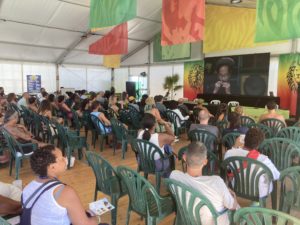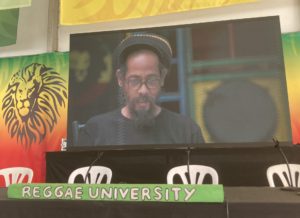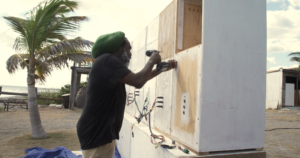‘Rockers Sound Station: Tales of the Kingston Dub Club’ Debut Screenings
One of the downsides of doing academic research on popular and street cultures is that it is quite difficult for the research outputs to reach out to those who have contributed to the research in the first place – those practitioners who have and continue to build the richness of the culture. As part of our effort to make the research available to a wider audience, as well as beneficial to the SST communities at large, SST has committed to film interviews and even sessions; the outcome to be archived on our YouTube channel that will be launched next year. We consider this a reliable way to engage with a broader audience than just researchers, to help support SST communities and possibly build the status of the practitioners. In the case of the Jamaica research, the quality and quantity of the material has prompted us to realise two short movies. SST friends and collaborators David Katz reports on the first two screenings of the SST documentary about the Kingston Dub Club.
By David Katz
—
The uncertainties and curtailments of the Covid-19 pandemic resulted in all kinds of challenges for the sound system community, not least because playing out became an impossibility in most territories (or at least illegal). Yet, for researchers in the field, the inability to travel and the lack of many regular distractions sometimes stimulated work that yielded unexpected results, one such project being our short documentary film, Rockers Sound Station: Tales of the Kingston Dub Club, which Dr Brian D’Aquino and I co-produced.
The roots of the film lie in our staging of the seventh edition of Sound System Outernational, titled ‘Sound Systems at the Crossroads’, which was held online in the summer of 2021 as a space in which sound system practitioners, performers and scholars could come together to reflect on the challenges facing the culture today and to discuss which resources the movement might tap to ensure continued flourishing (the archive of the event is available on the SSO YouTube channel). As we always feature an element of live performance at these symposiums, we approached Gabre Selassie, the founder of the Kingston Dub Club, to see whether he would agree to stage a live event at the Club, which would be streamed, and supplemented by an interview with the man, which we would conduct remotely and film with JD films, a local film company.

Film poster by Sherice Bromfield
Then, once the strictures of the pandemic waned and international travel became more viable, Julian Henriques (SST executive producer for the film) and I returned to Jamaica to conduct supplementary interviews with persons affiliated with the Dub Club who could give further context to the evolution of the space and their roles in helping to establish it, as well as Gabre’s transition from being a selector of the latest dancehall party tunes, to the Rastafari-oriented proprietor of Dub Club, following his work with the visionary producer Augustus Pablo and his experience of the UK dub scene, including time spent at the original Dub Club of Tufnell Park, north London.
The supplementary interviews were thus conducted in person with noteworthy speaker builders and technicians such as Ronnie Jarrett of 8 Mile Sound in Bull Bay, St Thomas, and Orville Swaby, a cousin of Augustus Pablo who runs a sound system workshop in Greenwich Farm, west Kingston. There was also Michie Williams of the Rockers Record Shop, the singer-songwriter Micah Shemaiah, and Austin ‘Spiderman’ Palmer of Jah Observer sound system, who has played at the Kingston Dub Club on several occasions. Julian and I conducted these interviews in different locations in Kingston, our crew led by local filmmaker Garreth Daley. These interviews provided a great insight into the way KDC grew from a very small event to a world-renowned sound system session. A final filming day in July 2022 at one of the Kingston Dub Club sessions directed by Brian allowed us to capture the unique vibes of the Sunday gatherings.

Filming at KDC, July 2022. Image © Brian D’Aquino
The editing process was long, with unexpected technical issues exacerbated by the team members being between London, Kingston, Naples, and elsewhere. But thanks to the skilful work our film editor Sherice Bromfield we were able to arrange for the world premiere to take place at Rototom Sunsplash, Europe’s largest and longest-running reggae festival. Since 2010 this massive, multifaceted event has been held place in the town of Benicassim, about an hour north of Valencia along the coast, but it began in the early 1990s in northeast Italy, and I began holding panel discussions there with performers, filmmakers, and practitioners in the early 2000s, when the festival was still held in the small town of Osoppo, at the foot of the Dolomites.
After having been hounded out of Italy by reactionary local politicians, who did not like the festival’s ecological and non-conformist sensibilities, nor its willingness to screen films about police brutality and state repression, nor its debates on euthanasia, drug laws and penal reform, since relocating to Spain, the festival has grown exponentially, the larger site and bigger crowds allowing for a fuller programme at the ‘Reggae University,’ where I continue to co-chair panel discussions with the broadcaster Pier Tosi, based in Bologna (Italy), and the joint editors of Riddim magazine, Peter Lilly and Ellen Koehlings, based in Cologne (Germany).
Rockers Sound Station premiere at Rototom Festival
Despite the unbearable record-breaking heat that swept Europe in the summer of 2022, the world premiere of Rockers Sound Station: Tales of the Kingston Dub Club was well attended on 19 August, the presence of cooling fans and ample protection from the sun both beneficial, while the few technical glitches that cropped up thankfully did not deter the audience.
During the post-screening Q&A, I was joined by Brian and Dr Sonjah Stanley Niaah of the University of the West Indies Mona Jamaica campus. We began by briefly informing the audience about how the Sonic Street Technologies project evolved from the Sound System Outernational events, which Brian and our colleague Leo Vidigal of the Federal University of Minas Gerais began holding in London while conducting postgraduate research with Julian. Brian and Sonjah went on to detail their roles with SST, as well as Brian’s spearheading of Bababoom Hi-Fi, the sound system and record label he runs in Naples, while Sonjah spoke about her longstanding work on various aspects of dancehall culture, as well as a related film she and Dennis Howard helped to make with us at the headquarters of the Jamaica Sound System Federation in Kingston.

Audience at Rototom premiere. Image © Brian D’Aquino
After discussing the evolution of the Rockers Sound Station film project we had a participated Q&A session. The first question was multifaceted, raising the issue of decolonising knowledge and questioning whether the project was reinforcing Western hegemony or challenging it, as well as asking how difficult it was to access funding and to justify the funding granted. Regarding decolonising knowledge, Brian and I emphasized that careful consideration had been made for the SST project to be enacted in conjunction with practitioners, academics, and creatives in the global South, so that the work is collaborative, rather than extractive. Brian noted how working with the Reggae Studies Unit at UWI as well as local academics and practitioners in Brazil, Colombia, Mexico, and India has allowed for more meaningful and less biased content to be generated overall. In terms of justifying the funding, he said that the project acknowledges how the question of fundings is crucial in any research trajectory and noted that one of the objectives of the SST project is to make good use of the fundings received by commissioning work to practitioners as well as local researchers active in the field of sound systems and other popular cultures who are – especially in the global South – often not affiliated to any academic institution.
A next question was put to Dr Niaah in relation to the perceived state repression of sound systems in Jamaica. Since Sonjah has campaigned to allow sound systems greater access to public spaces, what could she say about the issue of noise disturbances late at night, especially in communities with young children? Sonjah spoke of recent attempts to establish entertainment zones in Jamaica that are apart from residential areas, designated spaces where music can be played late at night without disturbing such communities, including one sanctioned space located near the airport. She went on to emphasize the systemic issues that in Jamaica will always denigrate what poor people create, dismissing as ‘noise’ what to others can be food for the soul; from the audience, Sonjah’s sister chimed in to emphasize that zoning is key to allowing the culture to thrive.

Rototom premiere was part of the Reggae University program. Image © Brian D’Aquino
Then, after thanking the panel for imparting knowledge about sound system culture, both in our discussion and in the film screening, the final questioner asked whether the project was actually contributing something to local communities (and if so, how), and questioned whether there is a sound system identity globally. Brian responded that one way the project tries to give back to the local communities is by using the academic brand attached to the project to raise the status of the popular culture in countries where it is usually blamed and repressed by the elites and the governments. It was also noted how the films produced by SST will all have shared copyright, so that the contributors may screen the films they co-produced and use them as they see fit. And in terms of the notion of a global sound system identity, Brian reminded that this question is exactly what the SST project is concerned with finding out, noting that keeping the focus on technology – rather than music – allows the project to take into account similarities as well as differences between different SST scenes. We reminded that the picos of Colombia and the sonidos of Mexico might have an affinity with Jamaican sound system culture, but that they evolved independently of what happened in Jamaica, so the technology is key to understanding what is similar and what is different.
Rockers Sound Station screening at HIM Dub Festival
The second screening of Rockers Sound Station took place on the 3rd of September at the first edition of a new sound system festival called HIM Dub, which was held on the banks of the River Coa, near the castle town of Sabugal, deep in the interior of eastern Portugal. It’s a beautiful setting for such an event, which was Rastafari-oriented and heavily weighted towards the UK Steppers and Euro Steppers scenes. HIM Dub was hosted by Nomad Embassy, a sound system launched near Lisbon in 2019, and since the team is small and with no commercial sponsorship, there were various technical issues to overcome (including a faulty projector). Once the correct video monitor was in place, the film screened to an attentive mix of locals and foreigners, many of whom had little concept of the Jamaican music scene, nor of sound system culture in general, since sound systems are a relatively new phenomenon in Portugal, largely attracting hippies, punks and anarchists from the rave party scene, though there is a small, committed band of Rastafari who are also currently active.

Master builder Ronnie Jarrett at work (still from film)
During the screening, I was pleased to hear people chuckle when Gabre Selassie spoke of sneaking his UK-made preamp through customs in Jamaica, and there was more laughter when he spoke of Augustus Pablo banning him from playing UK Steppers on the Rockers sound system at one point, directing him instead to a box of Studio One and Treasure Isle classics. So it was clear that the audience was getting the message, despite any language barrier, and the lack of subtitles.
The post-screening Q&A was rich and warmly received. A young lad broke the ice by asking, ‘Why do they mention boxes when they’re talking about speakers?’ which stimulated a discussion about how speaker boxes are designed and made in Jamaica, and the importance of them. This led to a broader discussion of the predominant sound system culture that evolved in the UK through the Jamaican diaspora, and the differences and similarities with that of Jamaica, as well as further iterations in Europe and farther afield. There were discussions about the founding of the Kingston Dub Club and what it came to represent as a unique space in Jamaican sound system culture at a time when dancehall reigned supreme, the transformative influence of Rastafari on Gabre Selassie, and the general meaning and importance that can be attributed to sound system culture in Jamaica and in Europe. Several people asked whether the film was available for streaming or as a DVD, which had also been the case at Rototom, validating our project in general and the film itself more specifically.
We have yet to organise the Jamaican premiere and look forward to screening Rockers Sound Station at the Kingston Dub Club itself. For now, I am thankful for the opportunity to screen the film at Rototom and at HIM Dub, and for the positive feedback we received.
—
Born in San Francisco and long resident in London, David Katz is the author of People Funny Boy: The Genius of Lee ‘Scratch’ Perry and Solid Foundation: An Oral History of Reggae. He has produced documentaries for Public Radio International, including Ring the Alarm: A History of Sound System Culture and has hosted the monthly reggae vinyl night Dub Me Always since 2004. Visit him at www.davidkatzreggae.com
